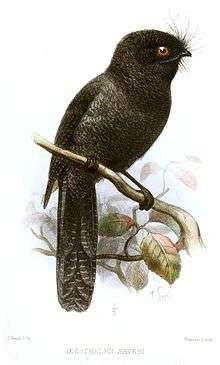New Caledonian owlet-nightjar
The New Caledonian owlet-nightjar (Aegotheles savesi) also known as the enigmatic owlet-nightjar, is a large owlet-nightjar (a kind of bird related to swifts and goatsuckers) with vermiculated grey-brown and black plumage. It has a long, slightly rounded tail, short, rounded wings, and long, stout legs. Its voice is unknown but similar birds make churring and whistling sounds. It is much larger than the related Australian owlet-nightjar.
| New Caledonian owlet-nightjar | |
|---|---|
 | |
| Illustration by Joseph Smit, 1881 | |
| Scientific classification | |
| Kingdom: | Animalia |
| Phylum: | Chordata |
| Class: | Aves |
| Order: | Caprimulgiformes |
| Family: | Aegothelidae |
| Genus: | Aegotheles |
| Species: | A. savesi |
| Binomial name | |
| Aegotheles savesi Layard,EL and Layard,ELC, 1881 | |
This bird is endemic to New Caledonia’s Melaleuca savanna and humid forests. Other members of its genus are highly territorial and nest in holes in trees. These birds also forage by sitting on a branch and attacking small animals. It is unknown if these habits apply to the New Caledonian owlet-nightjar, but this species is larger and has longer legs than the others, so it may be more terrestrial.
The type specimen was collected from a bird that flew into a bedroom in the village of Tonghoué. This large nightjar is known from two specimens taken in 1880 and 1915 and a couple of sightings. The most recent is from the 1998 expedition which saw a large nightjar foraging for insects at dusk in Rivière Ni Valley. That report has been taken to suggest that the species still survives in small numbers, but that total population is likely smaller than 50 individuals and declining.[1]
References
- BirdLife International (2018). "Aegotheles savesi (amended version of 2016 assessment)". IUCN Red List of Threatened Species. 2018: e.T22689559A129328996. Retrieved 29 February 2020.CS1 maint: ref=harv (link)
